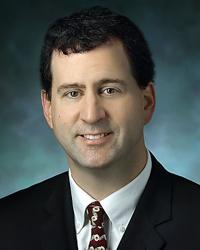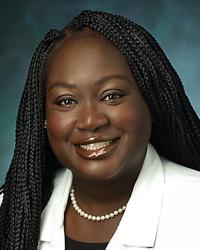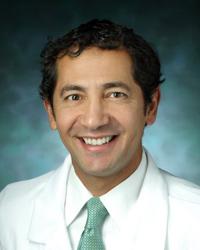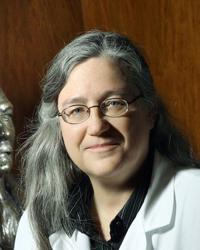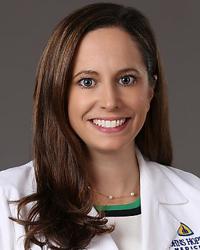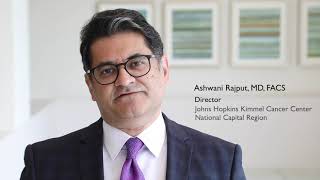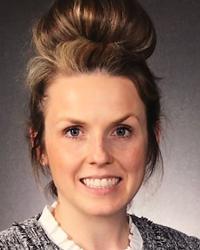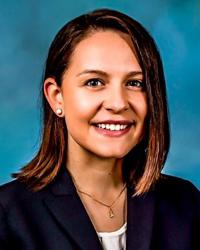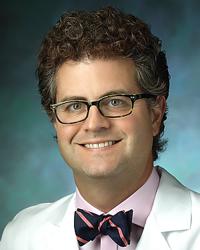Fellowships
- Bariatric Surgery
- Breast Surgery
- Cardiothoracic Surgery
- Critical Care Surgery
- Endocrine Surgery
- Pediatric Surgery
- Surgical Oncology
- Transplantation Surgery
- Trauma and Acute Care Surgery
- Vascular Surgery and Endovascular Therapy
Bariatric Surgery
The Bariatric Surgery Fellowship at Johns Hopkins is a well-established and continually evolving program with a 20-year history. It provides a comprehensive clinical experience with a focus on bariatric surgery and is accredited through the American Society for Metabolic and Bariatric Surgery (ASMBS) and the Fellowship Council.
The program spans one year and is located primarily at the Johns Hopkins Bayview Medical campus, where the Johns Hopkins bariatric surgery program is based. Fellows in this program gain exposure to various bariatric procedures, particularly sleeve gastrectomy, Roux-en-Y gastric bypass, revisional surgery, SADI-s (loop duodenal switch). There is a strong emphasis on robotic surgery, making up more than 50% of cases. A team of five experienced attending physicians in bariatric surgery, mentors and guides the fellow throughout their training. While the prime focus is on bariatric surgery, additional opportunities in abdominal wall reconstruction and foregut surgery are also available. Fellows in this program are expected to function as junior faculty members with full admitting, surgical, independent clinic, and call privileges, offering a comprehensive and hands-on experience in patient care. For successful completion of the fellowship, the fellow is expected meet all the standards required for ASMBS fellowship training.
To apply for this fellowship, prospective candidates should use the Fellowship Council's application process. All important dates related to interviews, deadlines, and match information can be obtained from the Fellowship Council's website.
Breast Surgery
This is a multidisciplinary fellowship designed to expose fellows to every specialty involved in the care of breast patients. Five months are devoted to breast surgery and seven to medical oncology, radiation oncology, plastic surgery, breast imaging, pathology, genetics, research and other disciplines. Fellows learn from world-class faculty. The required reading is intensive, providing a comprehensive survey of the most influential clinical trials that guide contemporary practice.
Johns Hopkins is a Regional Health Care System. Most of the rotations occur on the historic East Baltimore campus. Fellows will also spend one month on the breast surgery services at Johns Hopkins Howard County Medical Center, Johns Hopkins Sibley Memorial Hospital in Washington, D.C., and Johns Hopkins Suburban Hospital in Bethesda, Maryland. Local accommodations will be provided for the two months spent in Bethesda and Washington.
Learn more about the fellowship program.
The Breast Surgery Fellowship is generously supported by the annual PVDA Ride for Life Event.
Cardiothoracic Surgery
The Division of Cardiothoracic Surgery offers a three year training program in cardiothoracic surgery following completion of a surgical residency. The first year as a junior cardiac surgery fellow is evenly divided between Red and Blue cardiac surgery services. During the second year, six months are dedicated to the general thoracic surgery service and six months are spent as an elective experience locally in thoracic, cardac, or endovascular surgery. The third year of the residency is spent as a chief resident in cardiac surgery and is divided between Red and Blue cardiac surgery services.
The thoracic and second year fellows during the elective rotation are included with the two junior cardiac fellows in an in-house call rotation which averages one night in four. These four residents are responsible for all pre- and postoperative care of patients on their night on-call. The chief residents alternate call from home for emergency cases, including transplants.
The Johns Hopkins Hospital has a long history of training academic surgeons, both in general and cardiothoracic surgery. Hopkins cardiac surgery has been directed by leaders in the field, including Alfred Blalock, Vincent Gott, Bruce Reitz, William Baumgartner, Jennifer Lawton and now Ahmet Kilic. The Division strives to maintain this heritage by fostering clinical expertise, scientific inquiry, and intellectual development, the essence of an academic surgeon. To accomplish this goal, the training program in cardiothoracic surgery provides a wealth of clinical and operative experience in a collegial atmosphere, a diverse house staff and faculty interested in teaching, and a wide variety of clinical and basic research experiences.
Surgical Critical Care
The Surgical Critical Care Residency Training Program is a one-year fellowship open to surgeons who have completed the Johns Hopkins or another approved General Surgery Training Program. Fellows completing this program are eligible for a Certificate of Special Qualification in Surgical Critical Care.
Endocrine Surgery
The Endocrine Surgery Fellowship at Johns Hopkins is a comprehensive, integrated program organized according to a formal curriculum and overseen by Dr. Aarti Mathur and Dr. Lilah Morris-Wiseman. Our main objective is to provide multi-disciplinary, broad, and advanced training in endocrine surgery to surgeons who wish to pursue a career in this field. Fellows will develop mastery of the preoperative evaluation, intra-operative techniques, postoperative management, and pathophysiology associated with the care of patients with endocrine surgical disorders. Participating departments and divisions include Endocrine Surgery, Surgical Oncology, Otolaryngology/Head and Neck Surgery, Endocrinology, Cytopathology, Ultrasonography, and Nuclear Medicine.
The annual caseload is comprised of over 750 thyroidectomies, parathyroidectomies and neck dissections, and 50 adrenalectomies. Additional advanced techniques in which the fellow will become proficient include minimally invasive parathyroidectomy, laparoscopic adrenalectomy, posterior retroperitoneal adrenalectomy, neck dissections, endoscopic transoral thyroidectomy, laryngoscopy, neck ultrasonography, and ultrasound-guided fine needle aspiration. The fellow will play a leadership role in organizing and overseeing our weekly endocrine surgery teaching conferences and will actively participate in our regular multi-disciplinary thyroid and adrenal case conferences. The fellow will also participate in Endocrine Surgery University, develop and execute clinical research projects, and prepare associated abstracts/manuscripts for submission to professional academic meetings and peer-reviewed scientific journals.
Pediatric Surgery
Samuel Alaish, MD
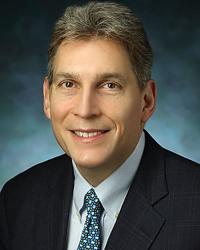
- Surgical Director, The Hopkins Resource for Intestinal Vitality and Enhancement (THRIVE)
- Associate Professor of Pediatric Surgery
The Pediatric Surgery Training Program offers intensive and broad exposure to the practice of pediatric surgery over a two-year period. During the first year, the fellow rotates for six months at Johns Hopkins Hospital and for six months at the University of Maryland Hospital to provide experience with clinical populations of two large university services. The second year is spent at Johns Hopkins. An optional third year of research training also is offered. Candidates for the program are selected through the Pediatric Surgery Resident Matching Program.
Learn more about the fellowship program.
Surgical Oncology
The combined Johns Hopkins Medical Institutions represent one of the world’s largest private non-profit medical centers. The medical institutions consist of the Johns Hopkins Hospital, The Sidney Kimmel Comprehensive Cancer Center, and the Bloomberg School of Public Health; all of which are located on the same campus in East Baltimore. The Johns Hopkins Hospital is a 1,000-bed tertiary/quaternary care facility with 45 operating rooms, 40,000 annual admissions and 26,000 operations per year. More than 5,000 cancer cases are seen per year at Johns Hopkins, of which more than 70% are treated surgically. The Sidney Kimmel Comprehensive Cancer Center has more than 100 faculty members dedicated to caring for cancer patients.
The Johns Hopkins Surgical Oncology program is an ACGME approved, two-year, post-residency fellowship. Two fellows per year are accepted into the program. Each fellow is designated to one of two tracks, depending on the interest of the applicant; 1) General/Research and 2) Hepatopancreaticobiliary (HPB). Qualified applicants are interviewed, ranked, and accepted through the national match, with applicants able to apply for each track via a distinct match designation. The first year for both fellows is composed of core rotations. Specifically, the trainee rotates clinically on gastrointestinal / HPB oncology, colorectal, breast, melanoma/sarcoma, endocrine surgery, medical oncology, and radiation oncology services. For the General/Research fellow, the second year is designed as an elective year in order to optimally accommodate the specific research interests of the trainee and provide additional clinical experience in specific surgical areas. Robotic training is emphasized in HPB and GI surgery. The HPB-designated fellow devotes the second year to a clinical focus in this field. Both fellows will be offered core training in clinical cancer research and will be expected to participate in, design, and conduct clinical research during their training. The didactic educational program offers a variety of weekly conferences for the fellows to attend and participate in during their training. The entire program is designed to generate a highly selected group of surgical oncologists who will provide academic leadership for the 21st century.
Johns Hopkins Surgical Oncology Fellowship Program
The Johns Hopkins Surgical Oncology program is an ACGME approved, two-year, post-residency fellowship. Two fellows per year are accepted into the program and each is designated to either general/research or hepatopancreaticobiliary. The second year of the general/research is an elective year that accommodates the specific research interests of the trainee and provides additional clinical experience in specific surgical areas. The HPB-designated fellow devotes the second year to a clinical focus in this field.
Transplantation Surgery
The two-year Transplantation Fellowship is open to surgeons who have completed the Johns Hopkins or another approved General Surgery Training Program. Fellows completing this program will have experience in adult renal, pancreatic and hepatic transplantation, as well as pediatric renal and hepatic transplantation.
Multi-Organ Transplant Fellowship
Thank you for your interest in the Multi-Organ Transplant Fellowship Program at the Johns Hopkins University School of Medicine. Our fellowship offers talented residents from the US and abroad the opportunity to train at a uniquely innovative program in one of the nation’s best hospitals, with the #1 ranked surgical residency. The Multi-Organ Transplant Fellowship is an ASTS-certified two-year program for liver and kidney transplant training. We are also ASTS approved to provide Hepato-Pancreato-Biliary certification. We have three fellows rotating through our program and we accept one to two transplant fellows each year.
All surgical procedures are performed by our transplant faculty and fellows. Our faculty is made up of highly experienced and academically successful leaders in transplantation. What sets us apart from other programs is the vast expanse of clinically diverse patients that are referred to the Johns Hopkins Comprehensive Transplant Center from around the world because of the reputation of our faculty and hospital.
Learn more about the fellowship program.
Trauma and Acute Care Surgery
The Trauma & Acute Care Surgery fellowship at The Johns Hopkins Hospital has evolved to train surgeons to meet the increasingly recognized need for emergency surgical treatment nationwide. The one-year fellowship requires American Board of Surgery certification or eligibility in general surgery and can be completed as a single stand-alone year or in the two-year sequence with our accredited multidisciplinary Surgical Critical Care fellowship. Trauma & Acute Care Surgery fellows function in the role of a junior faculty member with full admitting and operative surgical privileges at The Johns Hopkins Hospital and Johns Hopkins Bayview Medical Center.
The fellowship provides a broad clinical exposure to many aspects of acute care surgery and trauma. Fellows cover the combined acute care and trauma service and take in-house attending call at our Level I (JHH) and Level 2 (Bayview) adult trauma centers. The trauma population gives an extensive exposure to operative trauma management, as approximately 40% of cases seen at JHH and 25% of cases at Bayview are due to a penetrating mechanism. Additionally, fellows have the opportunity to treat a complex and diverse acute care surgery population and schedule elective cases.
Vascular Surgery and Endovascular Therapy
The Vascular Surgery and Endovascular Therapy Fellowship qualifies our graduates to sit for the Certifying Examination in Vascular Surgery as administered by the American Board of Surgery. This two-year clinical tract provides comprehensive experience in the diagnosis and management of the broad spectrum of circulatory disorders, including arterial, venous and lymphatic disease; as well as a high volume of thoracoabdominal and complex open aortic/visceral segment reconstructions and lower extremity tibial/pedal bypasses. The Fellow will participate in the outpatient evaluation and follow up of patients, receive ample training in our IAC-accredited Vascular Laboratory, manage the vascular surgery inpatient and outpatient services, participate in clinical research projects, and present findings at regional and national meetings. This fellowship is available to individuals who have completed five years of general surgical training. To learn more, visit the Vascular Surgery and Endovascular Therapy Fellowship pages.

